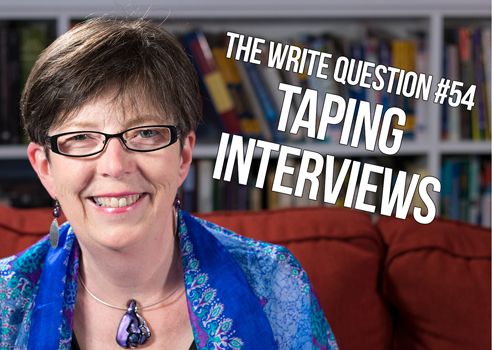Viewing time: 4 min. 17 sec.
The Write Question is a weekly video podcast about writing that I started in 2017 and that ran, more or less weekly, until April 2022. This is a republication of issue #54, with advice on taking interview notes. The post first ran on April 27/18.
Transcript:
Welcome to The Write Question. I’m Daphne Gray-Grant. Today we’re talking about taking interview notes.
I have a question from Jennifer Wain, a writer from London, Ontario. Here’s what she asked:
“Hi Daphne, it’s Jennifer Wain calling. I’m wondering if you have any pro tips to share about how to convert voice recordings to text. I currently tape all my interviews using the voice memo app on my iPhone and then I painstakingly transcribe all of my notes. It takes way too long and I’d love a quicker solution. Thanks very much.”
Thanks for the question, Jennifer. Several decades ago, I was a senior editor at the Vancouver Sun. I ran the features department and my reporters regularly had to interview actors, rock stars and famous authors. I was not a dictatorial editor — that’s not my style — so I didn’t issue orders. But I begged them NOT to tape their interviews.
There a couple of reasons not to tape interviews. It’s too much work, and it takes way too much time. And, in those days, there was also the risk of technological failure. If the tape jamed (we only had tape) then you might walk out of an interview with nothing. How embarrassing would that be? But if you could force yourself to use paper and a pencil, you would always have your notes. I didn’t persuade ALL of my reporters, but I probably convinced more than seven-eighths of them.
And as for me, in my 40-year career, I have NEVER recorded an interview. I always do my interviews when I’m at a computer so I can type, which is a lot faster than writing by hand. Because I can type without looking at the keyboard, I’ve never offended anyone by typing while interviewing them.
So, my first pro tip is stop taping. It may make you nervous at first but you will quickly become accustomed to the demands of note-taking by developing your own personalized form of shorthand. I’ve never learned a lick of conventional shorthand, by the way, but I do things like write the letter ‘w’ for “with.”
Another benefit of taking notes is that it helps you control the interview. If you need more time to think, you can just tell the person that you need a moment to catch up with your fingers. All interview subjects will understand that need, and it can give you some extra time to plan ahead.
And here’s my last tip about note-taking: After the interview, review your notes IMMEDIATELY, before you return to your office. (If you can’t stay in the same room, go no further than your car.) If you review your notes right away you’ll be able to clear up anything you’ve missed with better than 95% accuracy. I know this sounds weird but if you can do this review before going anywhere, you’ll find that it’s almost as if there’s a tape running inside your own head.
If you are still desperate to have transcribed notes, I have two other options for you. They both cost, but they will cost you less than spending all that time yourself. Check the links in the description below.
By the way, when I’m writing articles or blog posts, I sometimes use the voice activation software Dragon Naturally Speaking. I wondered if it might be possible to play back a recording to that software and get it transcribed that way. Unfortunately, I tried that and it didn’t work.
I suspect I’m not giving you the answer you were hoping to hear, Jennifer, but I really encourage you to stop taping every interview. Ask yourself whether it truly improves the quality of your interviews and your writing, or whether it’s just a habit.
Finally, let me wrap up with a quote from noted American investor Warren Buffet: “Chains of habit are too light to be felt until they are too heavy to be broken.”
Thanks for your question, Jennifer. If you can break the habit of recording your interviews, I think you’ll be getting rid of some pretty heavy chains.
Links:
Transcribe Download this app to your iPhone and the first 15 minutes are free. After that, it costs you $5 per hour.
TranscribeMe! This service costs 79 cents per minute and guarantees delivery within 24 hours.
Otter.ai This service uses artificial intelligence to transcribe very quickly. Accuracy is only so-so but it’s very inexpensive.


